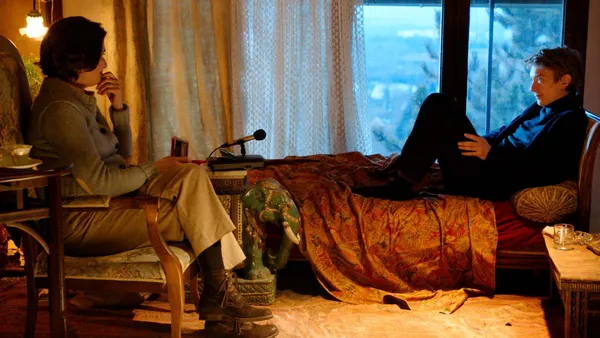Swann Arlaud as Yann Andréa and Emmanuelle Devos as Michèle Manceaux give tremendous performances that circle around discoveries of deep personal truths in Claire Simon’s beautifully staged I Want To Talk About Duras (a highlight of the 59th New York Film Festival in the Currents programme). When they meet for the two audiotaped sessions one day apart, Marguerite Duras, as an invisible presence, can be felt through the floorboards below, and, because she interrupts with instinctively strategically placed phone calls, offering coffee and impatience.
![Claire Simon with Anne-Katrin Titze on Marguerite Duras and Yann Andréa: “When she died he wrote a book which was adapted for the movies by Josée Dayan [Cet amour-là].”](/images/newsite/Claire_Simon_Anne-Katrin_Titze_225.webp) |
| Claire Simon with Anne-Katrin Titze on Marguerite Duras and Yann Andréa: “When she died he wrote a book which was adapted for the movies by Josée Dayan [Cet amour-là].” |
In early December 1982, Yann Andréa, longtime lover of Marguerite Duras, decided to speak to Marie Claire journalist Michèle Manceaux about his relationship to the famous novelist and filmmaker who was 38 years his senior, mainly to gain more understanding about himself. He, a gay man, fell completely under her spell, at first for her writing, then for the person he wrote to for a year before she responded. He had met Duras at a post-screening Q&A of India Song and shyly approached her.
"I will remember you as the symbol of love's forgetfulness," Duras wrote in the screenplay for Alain Resnais’s Hiroshima Mon Amour. Claire Simon’s film enters the mind of the listener and helps us remember.
From Paris, Claire Simon joined me on Zoom for an in-depth conversation on I Want to Talk About Duras and its stars.
Anne-Katrin Titze: Was the starting point that you felt: I want to make a film about Duras? Or was it the book by Yann Andréa? What was the beginning?
Claire Simon: It was the interview. This interview was published. I cut it down. The text, I really love Duras, but that had nothing to do with it. I was not at all ready to make a film about Duras. I didn’t see why or how. I just happened to read the book when it was published, which was not that long ago, in 2016. And I was amazed by it.
I have a friend who is a theater director, and she was working on Duras and I reread the book twice and then I thought I should try it. Because it’s obviously a text you could do in theater, but I thought it would be really interesting in fact to take the challenge of making it a cinema moment. What is a conversation? What is listening? How this sort of conversation could tell a love story which is also a dominating and submissive story. I thought mainly that the text was amazing.
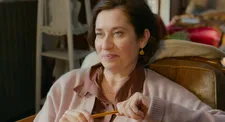 |
| Claire Simon on Emmanuelle Devos as Michèle Manceaux: “It’s a sort of incarnation, embodiment. She was listening so well, so much so that you had to see what she was listening to.” |
AKT: You mention submission, at one point he [Yann] says he doesn’t like the word “submission.”
CS: He says “acceptance.”
AKT: Yes, he says I’ll take acceptance, not submission. It’s beautiful what you capture between the two. And of course, it is not Duras herself, but the journalist speaking to him. There is a very interesting doubling and mirroring going on.
CS: Yes, originally Michèle Manceaux, she was a close friend to Duras and she lived nearby. And she accepted and liked very much Yann Andréa. I thought it was also the point of view of the director. I felt I was on her side, the person who is listening. What you see when you’re listening - you see scenes, you get into the discourse of the person you’re listening to. It was a friend and this interview was asked for by him. It was just a first step to write.
As I know his literature afterwards and I know Duras’s literature, I think this interview is very fresh and natural. It doesn’t feel the power of Duras on his words. You can feel his interior fight. He wrote very interesting books that she, Duras, corrected. He wrote about her when she was in the hospital, getting rid of alcohol. When she died he wrote a book which was adapted for the movies by Josée Dayan [Cet Amour-là].
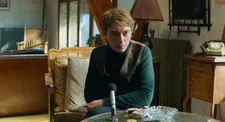 |
| Claire Simon on Swann Arlaud as Yann Andréa: “I wrote to him, you are the only one who can play that role.” |
He has a very small role in Josée Dayan’s film, it’s mainly Jeanne Moreau who is playing Duras. I really enjoyed very much this point of view of weakness. And the way he was seeing this weakness, trying to understand it. And I thought it was for us women a very great lesson because it is the reverse situation.
AKT: Of what we usually know, yes.
CS: And I thought so many women have heard over centuries: You don’t exist! Or, you only exist because of me! And when he asks himself: What is me? In every love story I think there is a bit where you ask yourself: What is me, in fact? I was very interested in that. I thought, as he was a man, he was free to look at himself. Maybe he had not the need of empowerment that we have. I thought for girls, for women, it was a very interesting point of view and quite universal.
AKT: He says he felt protected. She dressed him, she chose his perfume. I think many people will think of the gender reversal, because, as you say, he so openly speaks about it, as it is not a long tradition. Earlier you mentioned your theater director friend, what is her name?
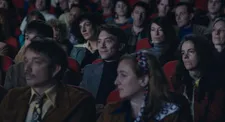 |
| Yann Andréa (Swann Arlaud) at the India Song screening. |
CS: She’s Isabelle Lafon. Actually she is making a screenplay about Duras, which will be released in Paris in January.
AKT: You made a perfect choice with your actors. I love them both. Swann Arlaud in François Ozon’s Grâce À Dieu plays the oscillation between victimhood and great strength. And also in Clément Cogitore’s Ni Le Ciel, Ni La Terre. In this role also he is encompassing so much. Did you know he’s the one?
CS: Yes, I knew. I wrote to him, you are the only one who can play that role. I had to convince him. He thought that the text was amazing, but nobody liked very much Yann Andréa. Nobody knew very much about him, but he was not a very attractive character. So it was a big move for him, not to try to imitate him physically, but to try to tell the text as if it were from him.
And they loved to play together. It was the first time they met, and I felt it was so strong the attraction to play together. He never talked so much in films, Swann, so I thought it was a big challenge that he would talk all the time. He had to put himself completely in the film. It was wonderful to work with both of them. I was amazed by them.
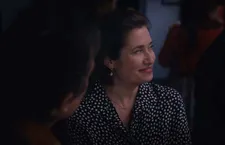 |
| Claire Simon on what Emmanuelle Devos said about listening: “It’s the most difficult thing in acting.” |
AKT: Emmanuelle Devos is a marvelous listener.
CS: Yes, she says it’s the most difficult thing in acting. Also we did very very long shots. Shots of 35 minutes. It was real, it was true, it was like jazz. I was the camera person and I knew what I wanted. Everyone was improvising together, one taking care of the other. That gave us a sort of trance in a way to do the interpretation.
AKT: The, let’s call it intermission, the walk back to her house is fascinating. She walks through the forest, as we as viewers imagine a life for her. And we are constantly surprised. How did this come about, the in-between of the two cassette tapes?
CS: I thought it was very interesting to be with her, to understand what she fantasises about him. And even though we think, okay, she’s a sort of writer alone in the country, in the forest, oh no, she dreams about sex, sex between Yann and Marguerite. And then, oh no, she has a man and they’re in love. It’s a way to explain how she was so much taken by listening. What it is to be a reporter or a writer is to be completely visited by the story.
You’re listening and trying to make it real in yourself. That’s why I made some fake situations where Swann goes to the bars. It’s a sort of incarnation, embodiment. She was listening so well, so much so that you had to see what she was listening to. It’s her ambiguous position also. That you think maybe she’s more interested in listening to Swann than in her husband at one point.
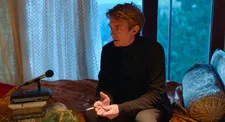 |
| Claire Simon on Swann Arlaud: “It was a big move for him, not to try to imitate him physically, but to try to tell the text as if it were from him.” |
AKT: I love that idea of visitation. Cinema, of course, is always visitation. I just recently watched Le Navire Night. Matthieu Carrière, Dominique Sanda and Bulle Ogier are mainly present silently listening. The exploration of the possibilities of storytelling is fascinating. Why does what we see have to correlate with what we hear when there is so much going on in our heads?
CS: You’re right. That’s exactly that.
AKT: I also recently saw Benoît Jacquot’s Suzanna Andler. We almost obsessively know always exactly what time it is. You give us the dates and the timing is punctuated by the phone calls from below. How did you time the phone calls?
CS: They are real. They were in the interview
AKT: Exactly that timing?
CS: Exactly. She had a sort of science. She knew. It’s unbelievable. He says “I’ve never made love before” and then she interrupts. At that time you had two telephones on one line, so you could talk from one telephone to the other from below and above.
AKT: Again, it’s so great because in our imagination, underneath what we see sits Marguerite Duras, trying to figure out what is going on, trying to control it all.
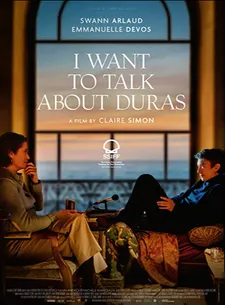 |
| I Want To Talk About Duras poster |
CS: Yeah.
AKT: The journalist asks him at one point what affected him. “Was it the dimension of time and death and not passion?” And he responds with “Yes, but passion struck by death.” Are passion and death two connected main themes?
CS: He was very much into getting into her mind. Through the literature he wanted to. When I show the India Song excerpt, he said something so strong, that “she filmed dead people.” I think it’s very very beautiful about her cinematography. It’s true that when you see them coming out of the castle like that, they look like dead people. This idea of remembering. Remembering is about dead people. I think he thought that passion was linked to death very clearly.
AKT: Dead people are also easier to control, which fits with her need to control. He says Duras has the laugh of an 18-year-old.
CS: Yes, or she is like a 15-year-old, she desires everything all the time.
AKT: It’s funny, I interviewed the director [Ebs Burnough] of the documentary on Truman Capote [The Capote Tapes], and with Capote, the laugh was the opposite, a deep, very masculine and old laugh. Lies is another important subject here. Duras accuses him of lying all the time and simultaneously, she herself doesn’t have to justify anything.
CS: Yes, this is one point of the reverse of men and women, which is so strong. Any man who is always afraid that his young girlfriend is lying all the time is obvious. Yeah, I think this moment is so strong when he says that. On the other hand he says “but for me she is the truth.” She tells the truth all the time. And truth for him, this is also about death and passion, is literature.
When you write, the characters exist because the story is finished. It’s death at the end more or less. It’s death that is making the literature quality of the character, because it has the complete story which goes to the death, to the past, or to phantoms.
AKT: Thank you for this conversation and a great film.
CS: Thank you so much!











